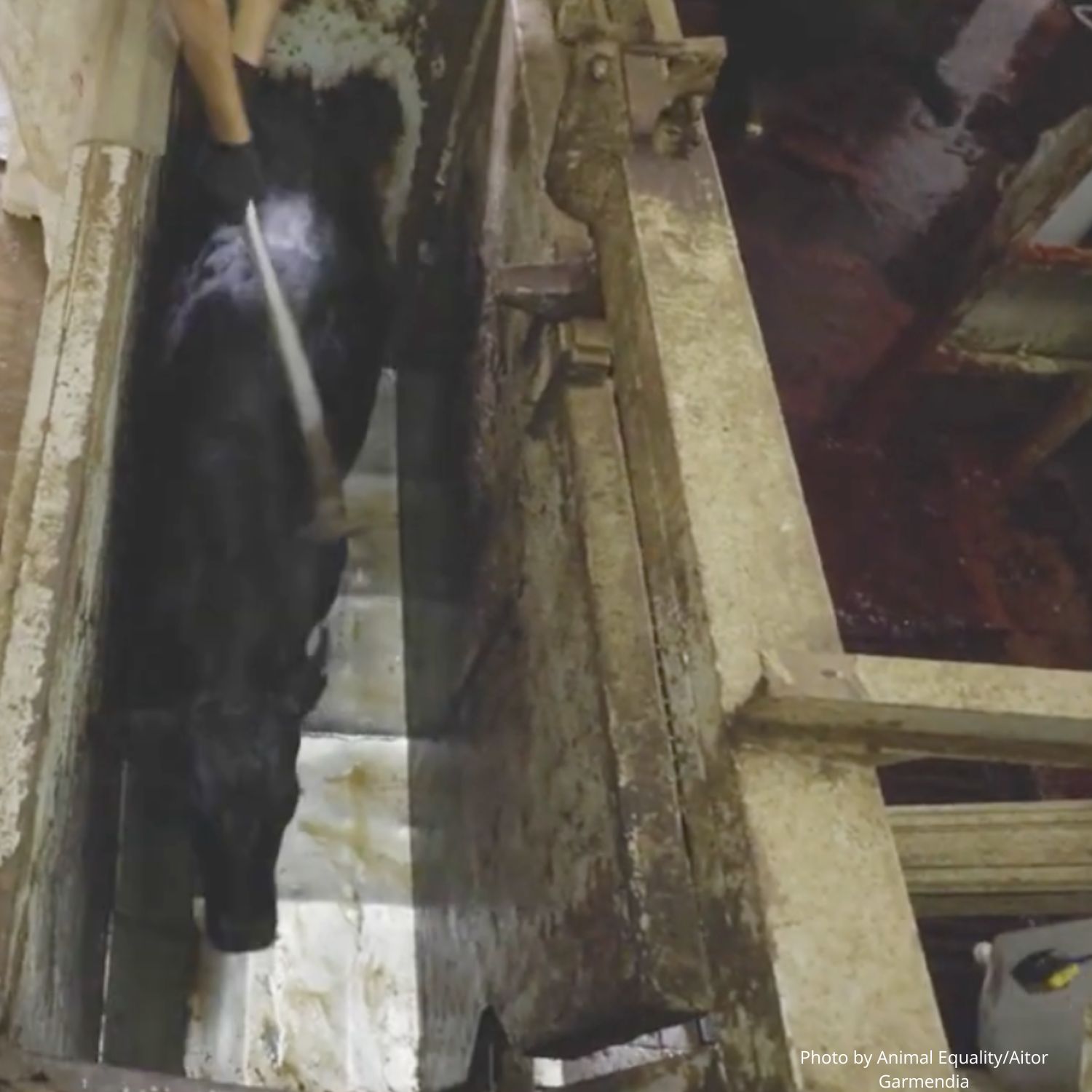‘Farmed’ removed from Scottish salmon labels
On 27th November, a tribunal took place – brought by Animal Equality UK and NGO WildFish – against the UK Government to scrutinise its decision to allow the Scottish salmon industry to drop the word ‘farmed’ from its Protected Geographical Indication (PGI) name. In a move we deem “reckless”, the judge ruled that Scottish salmon producers can label products simply as ‘Scottish Salmon’ under the PGI rather than ‘Scottish Farmed Salmon’, despite concerns from Animal Equality’s team and others that this change could mislead consumers.
Background
Although wild Scottish salmon is absent from all major supermarket shelves, public awareness remains worryingly low. A 2021 FIDRA survey revealed that a staggering 94% of consumers are unaware that the Scottish salmon sold in supermarkets is typically farmed. This lack of awareness was further highlighted by a 2024 YouGov poll commissioned by Animal Equality, which found that 41% of UK adults wrongly believe that wild-caught Scottish salmon is sold in UK supermarkets when, in fact, farmed Scottish salmon is available only.
Each year, over 52 million salmon are farmed and slaughtered in the UK, with most crammed into sea pens off Scotland’s coast. In these often lice-infested cages, the latest figures show that a staggering one in four die before even reaching the slaughterhouse. Given the escalating environmental damage caused by the salmon farming industry, coupled with serious welfare concerns and rising on-farm death rates, consumer transparency is more crucial than ever – particularly as there is an ongoing UK Government labelling consultation underway currently.
We knew this decision could not go unchallenged, so alongside WildFish and with endorsement from Dale Vince, founder of environmentally friendly electricity firm, Ecotricity, we launched a legal challenge against the UK Government to put ‘farmed’ back on this label.
What is a Protected Geographical Indication (PGI)?
PGI labels are designed to protect and promote regional food products closely linked to a specific geographical area. A well-known example is Champagne. Historically, Scottish salmon carried the designation ‘Scottish Farmed Salmon’, clearly indicating its farmed origin.
However, the UK Government’s decision now means this label will read simply as ‘Scottish Salmon’, eliminating the distinction between farmed and wild fish. While wider labelling rules currently still require ‘farmed’ to appear somewhere on packaging, we fear that the removal from the PGI will contribute to consumer confusion, particularly as ‘farmed’ can be in small print on a package and in some countries may not be legally mandated at all.
Animal Equality fought back
Animal Equality and WildFish challenged the Department for Environment, Food and Rural Affairs’ (DEFRA’s) decision, warning that removing the ‘farmed’ label from the PGI would mislead consumers and further greenwash the industry.
In support of the appeal, Dale Vince, founder of Ecotricity said:
People may think they are eating wild salmon, but the reality is it’s more likely to be farmed in Scotland, in pens in cramped conditions, infested with lice and diseased and dying fish. I support this appeal because fundamentally we need to know what we’re eating. We could all make better choices when we know where the food we’re choosing comes from.
WildFish and Animal Equality argued that the change would reduce transparency for consumers, making it easier for companies to downplay the reality of intensive salmon farming.
Tribunal ruling: appeal dismissed
DEFRA defended the change, claiming that ‘Scottish Salmon’ accurately described the geographical origin of the product and would not mislead consumers but our YouGov poll strongly suggests otherwise.
During the court hearing, Government lawyers actually admitted openly that there was “no need for the PGI to include unnecessary pejorative words” and that “no evidence before this tribunal or secretary of state of a product which includes pejorative language”. The fact that the Government used the term ‘pejorative’ – i.e. a term with negative connotations – to describe the word ‘farmed’ essentially illustrates our point, implying that the conditions on salmon farms across the UK are, in fact, seen as undesirable by many members of the public. This is unsurprising, given that our footage has shown fish suffering from deformities, lice outbreaks, disease, and welfare abuses.
With the evidence piled up high, and the industry’s reputation in tatters, it’s unsurprising that salmon execs proposed that the word ‘farmed’ be removed from the PGI. Consumers deserve more information, not less. In a world of growing misinformation and confusion, we need even greater transparency than ever before.
We are disappointed that this decision has not been overturned and we also see this as a clear indication that our work must continue to show the realities of this industry to consumers across the UK and around the world.
Abigail Penny, Executive Director of Animal Equality UK
What happens next?
Despite the ruling, the fight for transparency in salmon farming is far from over. Animal Equality remains committed to exposing the realities of the industry and ensuring consumers are fully informed about the origins of animal products on supermarket shelves.
With salmon farming facing increased scrutiny over environmental damage, animal welfare concerns, and misleading labelling practices, we will keep the pressure on for greater accountability, clearer consumer information, and a halt to this industry’s expansion. Migratory salmon should be able to swim wild and free in the ocean, not crammed into underwater cages.
Take action
The most impactful choice you can make is to stop eating farmed fish and other animals altogether. Sign up at loveveg.co.uk for delicious plant-based recipes, including a delicious smoked salmon alternative. You won’t want to miss out on these tasty options!
And, if you’re already plant-based, why not help spread the word? Share this with your friends and family to help raise awareness and make a difference!




